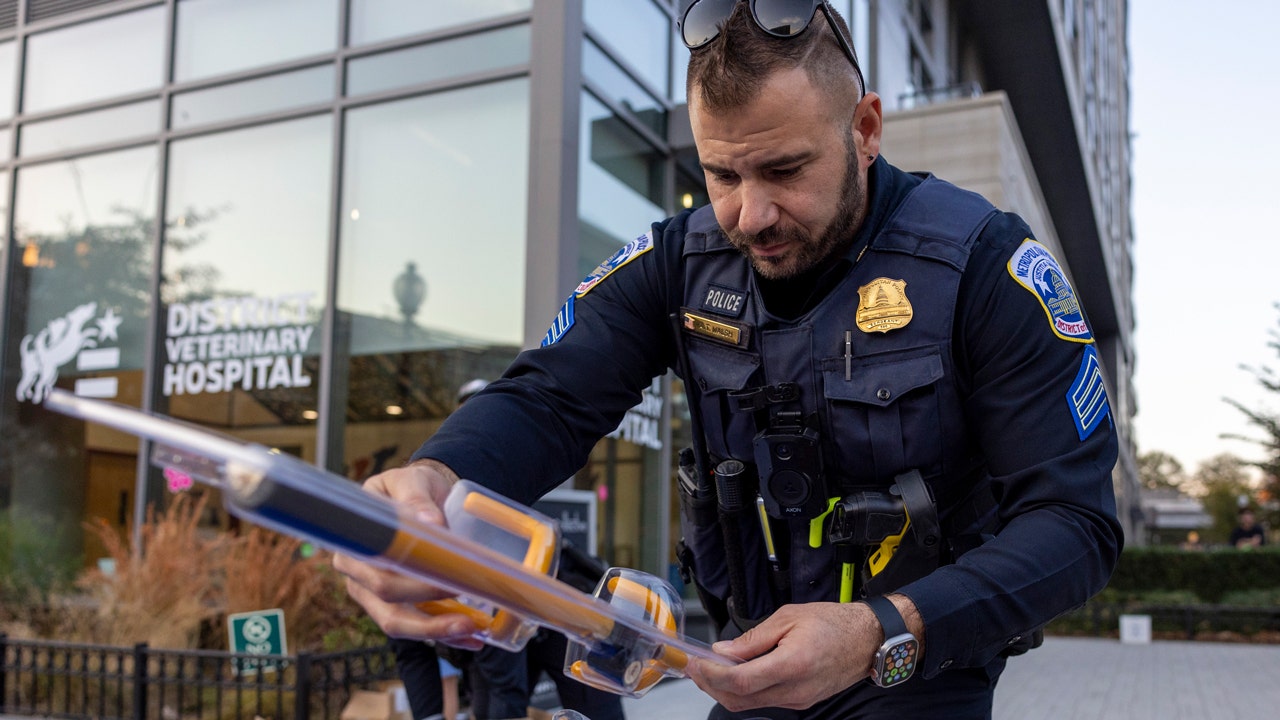This is Hot Pod, The Verge’s newsletter about podcasting and the audio industry. Sign up here for more.
Technology
Spotify’s podcast future isn’t very original
/cdn.vox-cdn.com/uploads/chorus_asset/file/23951394/STK088_VRG_Illo_N_Barclay_1_spotify.jpg)
When Spotify announced yesterday that it would lay off 200 employees from its podcast unit and combine Gimlet and Parcast into a single operation, it came as a shock to outside observers. But former and current podcast employees at Spotify have seen the writing on the wall for some time.
“We definitely have expected for several months now that they’d be axing people since the vibe at Gimlet had been very much one of walking on eggshells for months now,” one former Gimlet employee who was a part of yesterday’s layoffs told Hot Pod. “Zero joy. [The layoffs] were more just a matter of when. The fact that it was yesterday, that was the surprise.”
“Zero joy. [The layoffs] were more just a matter of when.”
It’s been more than a year since Spotify first eliminated its namesake podcast production unit. Last fall, Spotify laid off dozens of Gimlet and Parcast workers and pulled 11 original shows from production. It began this year by axing 600 jobs companywide (including a number of ad and business jobs under Podsights and Chartable). High-profile executives such as content chief Dawn Ostroff (who steered Spotify’s podcast operations) have left. Prominent names, including Barack and Michelle Obama’s Higher Ground Productions, Brené Brown, and Esther Perel, have exited deals with the platform. Jemele Hill hasn’t left yet but is weighing other options.
As Bloomberg reported last week, neither Parcast nor Gimlet had received annual budgets, so they hadn’t been able to greenlight new shows or approve travel expenses. It was only this week that we found out Spotify’s reasoning for this: both Gimlet and Parcast will be combined to form a new Spotify Originals studio focused on original productions, which will include producing shows like Stolen, The Journal, Science Vs, Heavyweight, Serial Killers, and Conspiracy Theories.
Another Gimlet employee who was laid off noted that production staff — producers, reporters, and engineers — seem to be most heavily hit by the job cuts.
Both nonfiction and fiction shows were impacted. Spotify spokesperson Grey Munford confirmed that Case 63, which dropped its first season last fall, will be continuing. The show is produced by Gimlet along with Julianne Moore and Oscar Issac’s production companies, FortySixty and Mad Gene Media. Much of the Gimlet fiction team behind Case 63, the chart-topping fiction podcast starring Moore and Issac, is now under Spotify’s head of development, Liz Gateley, according to Munford.
As far as what Spotify wants the remaining chunk of Gimlet and Parcast to be doing, it appears to be along the lines of not getting in the way as it embraces creators and third-party deals. The company spelled out clearly that the next phase of its podcast strategy was to focus on creators and users, including the Spotify for Podcasters — the company’s ad and monetization platform.
“We know that creators have embraced the global audience on our platform but want improved discovery to help them grow their audience. We also know that they appreciate our tools and creator support programs but want more optionality and flexibility in terms of monetization. Fortunately, Spotify is not a company that ever sits still. Given these learnings and our leadership position, we recently embarked on the next phase of our podcast strategy, which is focused on delivering even more value for creators (and users!),” wrote Sahar Elhabashi, Spotify’s head of podcast business.
“They’re very different styles of production and development.”
The merging of Gimlet and Parcast seems to be an unnatural one, according to a number of former employees. Parcast, which Spotify acquired in 2019, focuses largely on true-crime podcasts, with shows like Criminal Passion and Criminal Couples. Gimlet is known for its lineup of audio journalism series and interview podcasts, as well as scripted audio dramas. Gimlet won its first Pulitzer Prize in audio reporting earlier this year for Stolen: Surviving St. Michael’s by investigative journalist Connie Walker. A second season of Stolen has been greenlit.
“I’m not sure what folding Parcast and Gimlet together in one team means. They’re very different styles of production and development, so they need different kinds of support in terms of marketing, PR, development, and other skill sets,” said one former Gimlet employee, who left prior to this week’s layoffs.
Gimlet blew up largely due to its original shows, which helped define the podcast boom. Series like Reply All, The Nod, Heavyweight, and StartUp helped push the bar on what audio storytelling could be, and both advertisers and investors lined up to get involved. But under the leadership of Spotify, both Gimlet and Parcast struggled to find direction. Reply All came to an inglorious end just over a year ago, and Gimlet under Spotify hasn’t produced another equivalent hit.
The blame is at least partly due to Spotify’s inability to fully understand what it was buying for a combined total of roughly $300 million. Unifying Parcast and Gimlet was a good example of that.
“Our shows and content are very different,” said one Gimlet worker who was laid off yesterday. “The fact that Spotify is merging them so clumsily only further illustrates that they never really understood or appreciated either of us fully.”
The hasty merger and axing of original programming echo similar tactics from the world of streaming video, such as Warner Bros. Discovery’s decision to combine HBO Max and Discovery Plus’ offerings into one streaming platform or Paramount’s decision to merge Showtime (which generates premium scripted series like Yellowjackets) with Paramount Plus, which is home to shows from CBS, BET, and TV Land — as well as live sports.
Such decisions reflect the reality of today’s cash-strapped streaming environment. Much like how Netflix would once go on buying sprees at Cannes and now makes reality shows like Too Hot to Handle, Spotify is moving away from pricey originals and embracing amateur podcasters and creator partnerships (not to mention its highest-value celebrity audio deals, such as that with Joe Rogan). In both cases, companies are trimming their original programming in favor of content that is cheaper to produce and generates more eyeballs and downloads.
Less prestigious content won’t make a difference to advertisers, says Max Willens, a senior analyst at Insider Intelligence. “I would say that advertisers will welcome this decision in the sense that it may give them more inventory to advertise against, possibly at a more attractive price. The longform, highly produced content that Gimlet made its name creating was costlier and took longer to produce, and often commanded premium ad prices, which advertisers sometimes chafed at.”
But for those who work in the audio industry, Spotify’s hasty exit from the world of podcasting and original audio journalism aligns with the behavior they’ve grown to expect from the tech company.
“[The individuals laid off] are some of the most talented, experienced producers in the entire industry,” said a Gimlet staffer who left prior to this week’s layoffs. “It’s disappointing that Spotify never understood that — and how to harness that creativity and experience.”
Audiobooks and podcasts may become a haven in the event of a SAG strike
SAG-AFTRA overwhelmingly voted in support of a strike if they don’t reach a deal with the studios, union leadership announced on Monday night. Although SAG-AFTRA is known traditionally as Hollywood’s actor union, its 160,000-strong membership includes DJs, news anchors, voiceover artists — as well as podcast hosts and audiobook narrators.
The looming SAG-AFTRA strike is with the Alliance of Motion Picture and Television Producers (AMPTP) and would only impact contracts bargained with them. Productions covered by SAG’s TV and theatrical contracts would be considered off-limits.
“Only productions that are covered by the TV/Theatrical Codified Basic Agreement and Television Agreement would be struck in […in the event of a strike]. Scripted dramatic live action entertainment production that is covered by the SAG-AFTRA TV/Theatrical Contracts would be considered struck work,” wrote SAG-AFTRA’s chief communications officer Pamela Greenwalt in an email.
In other words, most podcast and audiobook contracts under SAG-AFTRA would not be considered “struck” work. This is in contrast to the ongoing WGA strike, where writing on scripted, fiction podcasts covered by WGA isn’t kosher and striking members are not allowed to work on non-union projects.
“So while work by any member (celebrity or otherwise) under SAG-AFTRA’s Audiobook Contracts would NOT be covered by a TV/Theatrical strike, all members will honor that action in the areas of work that are impacted should a strike need to be called,” clarified Greenwalt.
Which means that for performers looking to work during a Hollywood strike, the audio world may become their go-to destination. Celebrity audio dramas have certainly become in vogue lately, with the likes of Demi Moore, Chris Pine, Rami Malek, Matthew McConaughey, and others contributing their voice talents to fiction podcasts. Audible has showcased a number of celebrity-narrated audiobooks by Meryl Streep, Tom Hanks, Nicole Kidman, Thandiwe Newton, and others.
It’s still uncertain whether SAG-AFTRA will even call a strike. The union is scheduled to start contract negotiations with AMPTP on June 7th. In the event that they’re unable to reach a deal with the studios, SAG-AFTRA can then take steps to go on strike.

Technology
Twitter is officially X.com now
/cdn.vox-cdn.com/uploads/chorus_asset/file/24805888/STK160_X_Twitter_006.jpg)
The social network formerly known as Twitter has officially adopted X.com for all its core systems. That means typing twitter.com in your browser will now redirect to Elon Musk’s favored domain, or should. At the time of publication, we’re seeing a mix of results depending upon browser choice and whether you’re logged in or not.
A message also now appears at the bottom of the X login page that reads, “We are letting you know that we are changing our URL, but your privacy and data protection settings remain the same.”
Musk has a long history with the x.com URL, launching a business under the name in 1999 that eventually merged with what would become PayPal. For this modern-day version of the company, Musk envisions that it will become a WeChat-like “everything app.”
Maybe, but one thing’s for sure: it’s not Twitter anymore.
Technology
Keyless car theft is on the rise. This is how to protect yourself.

- Using a relay device, car thieves can amplify the signal from your wireless key fob, even if it is inside your house, and use it to unlock your car.
- Storing your key fob in a Faraday bag or using a physical steering wheel lock can help guard you from car theft.
- As technology evolves, so do criminal methods. Staying current on information is another important way to protect yourself.
They appear like ghosts in the night, standing outside your house, one holding up an antenna while the other crouches next to the car parked on the driveway. Within seconds, your car is gone, yet another victim amid a surge in auto theft enabled by the technology designed to make it easier to unlock and start vehicles.
Auto technology has evolved and many newer cars use wireless key fobs and push-button starters instead of traditional metal keys. The fob sends a short-range signal, so when the driver approaches the car, it automatically unlocks the door. This saves you the hassle of digging out your keys when you’ve got your hands full with groceries.
But that technology also makes things easier for thieves. The wireless fob will continue to emit a signal even if you’re not using it. Thieves prowl neighborhoods at night looking for cars parked outside so they can carry out so-called relay attacks. Using portable equipment that can pick up the faint signal from a fob inside the house or parking lot, they relay it back to a transmitter that can clone the signal.
NEW TREND OF ‘BURGLARY TOURISM’ ON THE RISE
Officials have urged carmakers to reduce the security vulnerabilities and warn owners about the risks.
So what can you do to reduce the odds that your car will be gone in 60 seconds? “It’s relatively easy for drivers to protect themselves,” said Steve Launchbury, principal engineer of automotive security at Thatcham Research, a U.K.-based automotive risk intelligence company. Here are some tips:
USE A SIGNAL BLOCKER
A simple but effective way to stop auto bandits from purloining your key fob signal is to use a Faraday bag or pouch. They’re lined with a conductive metal mesh that blocks the transmission of electromagnetic signals.
Metropolitan Police Department Sgt. Anthony Walsh sets out steering wheel locks at an anti-crime event in Washington on Nov. 7, 2023. A physical lock that attaches to the steering wheel can act as a visible deterrent to car thieves. (AP Photo/Amanda Andrade-Rhoades, File)
The pouches aren’t expensive, and you can also get boxes that do the same thing. But experts advise testing to make sure they work. Just put the key fob inside and approach your car. If the doors don’t automatically unlock, then the signal is being blocked.
It’s also important to remember to use it whenever you leave your vehicle, and don’t forget to put all of your key fobs inside, including any spares.
But ignore some advice making the rounds on the internet telling you to put your fob in the microwave or freezer. It doesn’t have the same effect as a Faraday bag, and you risk damaging your key.
GET AN OLD-FASHIONED LOCK
Try an old-school solution by using a physical lock. Some police forces advise car owners to use them to make your vehicle look less tempting to steal. The reasoning is that a would-be thief might be deterred by the effort needed to cut through the lock and instead turn their attention to an easier target.
Locks, in the shape of a disk or a long bar, clamp onto the steering wheel and make it difficult to steer. There are also versions that prevent the car from being put in gear. The downside is you’ll need extra time to attach or remove it whenever you aren’t driving.
CHANGE UP YOUR SETTINGS
For many cars, it’s possible to deactivate the wireless setting so that you can’t open the door remotely. For Fords, Hondas and Audis, use the touchscreen menus. If you own a Toyota, you can temporarily disable the signal by holding down the fob’s lock button and at the same time pressing the unlock button twice. If you’ve done it correctly, the fob’s indicator light should blink four times. Be aware that the next time you press any button, remote unlocking will be reactivated.
The method will vary depending on make and model so consult your owner’s manual for the exact process. If it sounds complicated, there are YouTube videos that walk you through it. Don’t forget that in most cases you’ll now have to manually press the fob’s unlock button.
Automakers have started adding motion sensors to key fobs. If the sensor doesn’t detect recent movement because it’s been, say, left on the kitchen counter after you come home, the fob goes into sleep mode and stops transmitting. If it lacks this capability, check with your dealer whether it’s possible to upgrade it.
If you buy a used car, some experts also advise getting the keys reprogrammed, just in case the previous owner kept one of the fobs.
WATCH OUT FOR NEW METHODS
Researchers have uncovered a new auto theft technique that doesn’t target radio signals. The controller area network, or CAN, is “a feature of modern cars which allows different components and systems to communicate, (and) has recently been targeted and exploited by thieves,” said Thatcham’s Launchbury.
The network allows sensors and control modules to talk to each other directly, instead of going through a central node. Thieves take advantage by accessing the network from the car’s exterior, usually by removing a headlight and connecting a device that can “inject” a signal, tricking the car into unlocking and starting.
While automakers work on improving CAN security, “there are steps drivers can take today to add layers of security and deter criminals,” such as using a physical lock, Launchbury said.
Aftermarket electronic immobilizer systems “should render a criminal’s theft tool useless,” and might even get you a discount on auto insurance, he said. Thatcham and other companies offer them but the downside is they can be quite pricey.
Technology
iMessage had an outage, but now it’s back
/cdn.vox-cdn.com/uploads/chorus_asset/file/24401979/STK071_ACastro_apple_0002.jpg)
On Thursday evening, many iPhone owners (including some here at The Verge) saw the “not delivered” flag when trying to send texts via iMessage. People reported the problem across multiple wireless carriers (Verizon, AT&T, and T-Mobile), countries, and even continents.
The Apple services status page didn’t show any indication of trouble while the problems were going on, but now it has been updated after the fact, reflecting a resolved issue where “Users were unable to use this service” for iMessage, Apple Messages for Business, FaceTime, and HomeKit. According to the note, the problems went on from about 5:39PM ET until 6:35PM ET.
Apple has not responded to inquiries or otherwise commented on the issue; however, judging by our use and reports on social media, everything seems to be up and running again. However, if your international friends are still saying, “Just use WhatsApp!” there isn’t really anything we can do about that.
Update, May 16th: Noted the issue appears to be resolved.
-

 Politics1 week ago
Politics1 week ago'You need to stop': Gov. Noem lashes out during heated interview over book anecdote about killing dog
-

 News1 week ago
News1 week agoMan, 75, confesses to killing wife in hospital because he couldn’t afford her care, court documents say
-

 Politics1 week ago
Politics1 week agoRFK Jr said a worm ate part of his brain and died in his head
-

 World1 week ago
World1 week agoPentagon chief confirms US pause on weapons shipment to Israel
-

 Politics1 week ago
Politics1 week agoHere's what GOP rebels want from Johnson amid threats to oust him from speakership
-

 World1 week ago
World1 week agoPro-Palestine protests: How some universities reached deals with students
-

 World1 week ago
World1 week agoConvicted MEP's expense claims must be published: EU court
-

 Politics1 week ago
Politics1 week agoCalifornia Gov Gavin Newsom roasted over video promoting state's ‘record’ tourism: ‘Smoke and mirrors’














